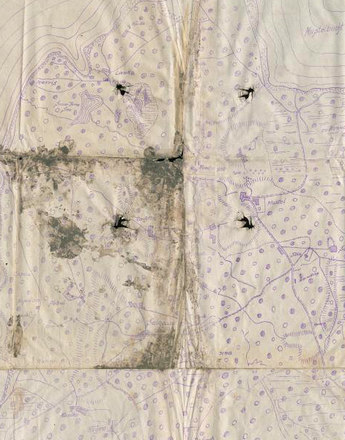I did not want it: Die letzten Tage der Menschheit (The Last Days of Mankind)
Karl Kraus’s anti-war drama is a satire in which reality parodies itself, with more than two hundred scenes, most of them short, but no continuous plot. The work was produced in the years 1915 to 1922 as a reaction to the First World War.
Kraus had declared it to be unperformable and wrote in the preface to the book edition: ‘The performance of the drama, which, if measured by terrestrial time, would take about ten evenings, is intended for a theatre on Mars. Theatregoers of this world would not be able to endure it.’
When the war began Kraus was still an admirer of Archduke Franz Ferdinand, the heir to the throne. After he was assassinated in Sarajevo Kraus wrote an obituary, which he published in his journal Die Fackel (The Torch) in the summer of 1914. His attitude changed with the horror and the inhumanity of the war. He sympathized with the Social Democrats and consequently condemned the Habsburgs, but above all the German Emperor Wilhelm II. Kraus’s point of view was that it was the politicians and the generals who were jointly responsible for this global conflagration.
At the beginning of the war Kraus initially stopped the issues of Die Fackel and then did not publish anything until November 1914, when he brought out the essay In dieser grossen Zeit (In These Great Times):
In these great times, which I knew when they were still ever so small; which will again become small if they still have time to do so; … in these loud times, which groan under the horrendous symphony of deeds which bring forth reports, and of reports which are to blame for deeds: in such times you cannot expect from me any word of my own.
From then on Kraus wrote more or less only texts against the war. Issues of Die Fackel were repeatedly confiscated; the censorship prevented its regular appearance. The polemics it contains against the war and those responsible for it formed the basis for his ‘global tragedy’ Die letzten Tage der Menschheit, which he began in 1915 and published as preprints in Die Fackel. Kraus borrowed from the soldiers’ song Du Deutschland und du Österreich, addressed to Germany and Austria, which contains those nationalistic battle cries still remembered today:
A bullet for the Russki,
A kick in the pants for the French pig
And another for the Brit, the prize pig.
Give the Jap a slap
And smash the Serb to smithereens.
Kraus gives his own version of the song, which sarcastically explains ‘ ’ow t’ use it’:
If you are chasing the Frenchie in battle, then give him a good boot in the pants.
If you meet up with a mercenary Brit, then treat him to some good kicks.
If you see the Russki from afar, then get that bullet ready.
There are only a few scenes which deal directly with acts of war; Kraus blamed the true atrocities on the behaviour and the superficiality of those who grew wealthy away from the front, profited from the war and used patriotic phrases to glamorize the war, that is to say journalists (and writers and poets), arms dealers, and high-ranking officers who boasted of their deeds far away from the horrific battlefields.
For Kraus it was Wilhelm II who provided the image of the enemy, and he parodied him with authentic quotes. Kraus uses a pair of opposites, the grumbler and the optimist, as satirical commentators on current events and the war, together with the figures of the subscriber and the patriot; by doing so he anticipates elements of later forms of light entertainment.
The drama ends with an apocalyptic scene in which humanity is wiped out by the cosmos. All human beings have shown themselves to be unworthy of living in this world because they allowed the inhumanity and cruelty of the war and hence must perish. ‘I did not want it,’ is the last sentence uttered by the ‘Voice of God’ in the drama, and really was said by Kaiser Wilhelm II..
Translation: Leigh Bailey
Digitale Edition der Fackel (mit Volltextsuche) der Österreichischen Akademie der Wissenschaften. Unter: http://corpus1.aac.ac.at/fackel (19.06.2014)
Kraus, Karl: Die letzten Tage der Menschheit. Unter: http://www.welcker-online.de/Links/link_953.html (19.06.2014)
Stein, Ernst: Nachruf auf eine Epoche. Karl Kraus und der Erste Weltkrieg. Unter: http://www.zeit.de/1966/07/nachruf-auf-eine-epoche (19.06.2014)
Quotes:
„The performance of the drama ...": Kraus, Karl: Die letzten Tage der Menschheit. Unter: http://www.welcker-online.de/Links/link_953.html (19.06.2014) (Translation)
„In these great times ...": Kraus, Karl: In dieser großen Zeit. Unter: http://gutenberg.spiegel.de/buch/5673/28 (19.06.2014) (Translation)
„A bullet for the Russki ...": Digitale Edition der Fackel (mit Volltextsuche) der Österreichischen Akademie der Wissenschaften. Unter: http://corpus1.aac.ac.at/fackel (19.06.2014) (Translation)
„If you are chasing the Frenchie ...": Kraus, Karl: Die letzten Tage der Menschheit. Unter: http://www.welcker-online.de/Links/link_953.html (19.06.2014) (Translation)
-
Chapters
- ‘Rabble of words’ – Writers in the War
- ‘An area to which only those who are (un)employed there have access.’
- The war after the war – reflection, homecoming and review
- ‘ … with deadly weapons, the golden plains’: Grodek as the legacy of the poet Georg Trakl
- ‘Guilt is always beyond doubt!’ Franz Kafka’s 'In der Strafkolonie' (In the Penal Colony)
- I did not want it: Die letzten Tage der Menschheit (The Last Days of Mankind)
- Anti-war literature as a bestseller: Im Westen nichts Neues (All Quiet on the Western Front)
- ‘What remained was a mutilated trunk that bled from every vein.’ Stefan Zweig and his "World of Yesterday"






